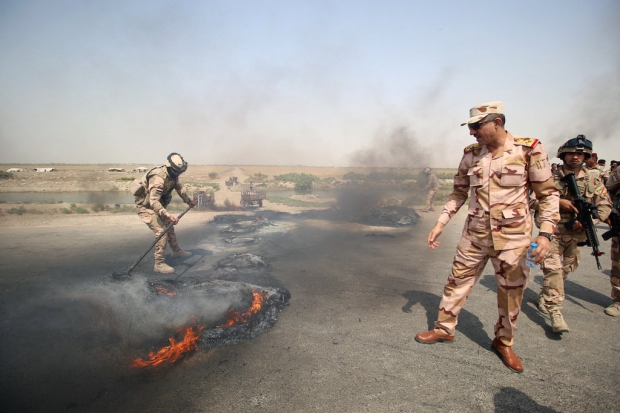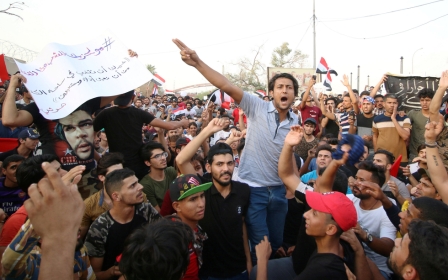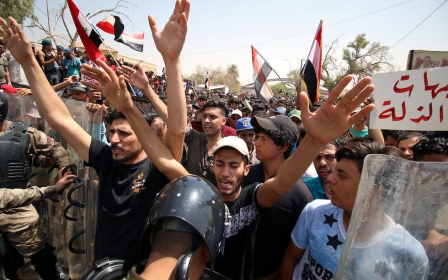Iraq's top Shia cleric Sistani turns up heat of protest movement
Iraq's top Shia authority, Ali Sistani, on Friday called on the government to meet the demands of protesters and form a new government, as unrest continues over power cuts, water shortages and unemployment.
Speaking to followers in his Friday sermon, a representative of Sistani said that Prime Minister Haider al-Abadi needed to work "urgently" to placate the protesters.
"The current government must work hard urgently to implement citizens' demands to reduce their suffering and misery," Sistani's representative said during the sermon in the Shia holy city of Kerbala, apparently relaying the words of Sistani himself.
He also called for the creation of a new government, an aim so far unrealised since 12 May elections were marred by allegations of voter fraud.
"He [the new prime minister] must launch a relentless war against the corrupted and those who protect them," said the representative.
At least 16 people have been killed and hundreds wounded since protests began in Basra on 8 July. Although initially focused in the southern city, which has been afflicted with water and electricity shortages during 50 degree celsius temperatures, the demonstrations spread to other provinces and cities, including Baghdad, Diwaniya, Babil, Najaf and Kerbala.
Iraq's security forces have reacted with violence to the demonstrations, while the government has imposed blocks on the internet, which Amnesty International claimed was a means of preventing protesters from uploading images of abuse.
He’s essentially supporting the protests and implicitly calling for violent escalation
- Duaa Malik, Iraqi analyst
Sistani's representative added that even if "demands for reforms fade away," they would soon return "much stronger".
"In a Friday sermon, three years ago, we warned that those who oppose reform and are betting that the calls [for change] will die down must know that reform is an absolute necessity," he said.
Religious influence
Abadi welcomed Sistani's intervention, saying on Twitter the religious authorities shared his desire for "a strong, prosperous and stable Iraq, in which the security, safety, justice and prosperity of all its children can be achieved, and where there is no place for the corrupted and the syphoning of public money".
The Shia religious authorities have in the past been highly influential in mobilising Iraqis, most notably in 2014 when a call by Sistani led to the creation of the Hashd al-Shaabi paramilitary units to fight the Islamic State group (IS).
However, some protesters have recently voiced their anger at religious and sectarian influence on Iraq's politics, with at least one demonstration in Baghdad featuring chants of "Not Sunni, not Shia, secular, secular!"
One protester suggested to Middle East Eye that the intervention by Sistani had aimed at preserving the political system and undermine the protests.
He added that the Shia establishment felt threatened by the demonstrations as much as the government.
However, Duaa Malik, a Washington-based Iraq analyst, branded Sistani's comments "dangerous," as they implied a potentially violent escalation in what have been so far peaceful protests.
"He's essentially supporting the protests and implicitly calling for violent escalation," she told MEE, adding that protesters had reiterated a call for peaceful protests in the wake of his comments.
"If that were to happen, then it would be used as means to suppress the revolution happening against the government altogether, and that’s what’s truly dangerous about his statements this Friday."
Further protests
Further demonstrations were set to take place across Iraq on Friday evening. The roads to Tahrir Square in central Baghdad were reportedly blocked off in anticipation, while demonstrators began gathering outside provincial buildings in Basra.
On Wednesday, Basra's provincial council called for the government in Baghdad to grant more autonomy to the region, along the lines of the Kurdistan Regional Government (KRG) in the north of Iraq.
He said that Baghdad owed Basra $45bn.
Basra province is home to some of the largest oil reserves in the country, as well as the only seaport. As such, Baghdad is likely to be reticent about allowing further decentralisation of powers to the region.
The backdrop to much of the unrest is the failure to form a national government. The Sairoun Alliance, a coalition of supporters of Shia cleric Muqtada al-Sadr, the Iraqi Communist Party and others, won the largest number of votes in the election, for which there was a low turnout. But accusations of voter fraud have led to a recount, delaying any attempts to build a coalition government.
Muntazar al-Zaidi, a parliamentary candidate for Sairoun most famous for throwing a shoe at former US president George W Bush, told MEE that he was supporting the demonstrations and said a new government was needed.
"Maybe, if we have an independent government, the people will go back home," he said.
New MEE newsletter: Jerusalem Dispatch
Sign up to get the latest insights and analysis on Israel-Palestine, alongside Turkey Unpacked and other MEE newsletters
Middle East Eye delivers independent and unrivalled coverage and analysis of the Middle East, North Africa and beyond. To learn more about republishing this content and the associated fees, please fill out this form. More about MEE can be found here.





